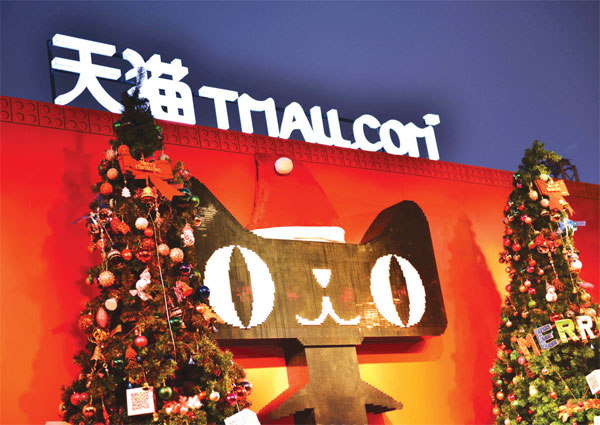Taobao and regulator must refine e-business
By Wu Yixue (China Daily) Updated: 2015-01-31 08:02
|
|
|
A Tmall logo made from Lego bricks is displayed in Hangzhou, the headquarters of Alibaba Group Holding Ltd. Long Wei / For China Daily |
The squabble between China's e-commerce giant Alibaba and the State's market regulator, caused by a product quality report, points to improved market environment and governance.
A quality report issued by the State Administration for Industry and Commerce on Jan 23 said taobao.com, China's largest consumer-to-consumer platform owned by Alibaba, had the worst performance among six online shopping sites. The quality check, conducted between August and October, showed that only 37.25 percent of the sampled goods from Taobao were authentic, compared with 90 percent for JD.com and 85.7 percent for Tmall, an Alibaba business-to-consumer site.
Following the quality controversy, Alibaba's US-trade shares lost about 4 percent and dropped to $98.45 on Jan 28, after falling to $102.94 at close on Jan 27, down by 1.01 percent from Jan 26.
On Jan 27, Taobao said it would file a complaint against Liu Hongliang, deputy head of SAIC's e-commerce trading supervision department, for abusing power and using improper supervision procedures, which, it said, had resulted in "very serious" losses to the company. "We welcome fair monitoring, but we are opposed to misconducts ... Liu employed a wrong method to reach a conclusion that is not objective," Taobao said. That it has challenged the regulator reflects a more tolerant government which allows the market to play a key role.
SAIC responded by posting a white paper on its website on Jan 28, saying Taobao had failed to clean up its business in five areas, including a flawed rating system for vendors, a low threshold for opening up on-site business, lax scanning of information on goods and allowing merchants to operate without business licenses. The report shows that the State regulator is committed to its task while trying to give full play to a healthy market.
The method used by SAIC in the August-October quality check, however, has evoked protests from Taobao as well as some netizens, because 51 of the 92 samples chosen for inspection were from Taobao. This means 41 of the samples came from as many as five online retailers. SAIC's refusal to allow the companies the right to apply for re-examination also has been a source of conflict.

I’ve lived in China for quite a considerable time including my graduate school years, travelled and worked in a few cities and still choose my destination taking into consideration the density of smog or PM2.5 particulate matter in the region.












